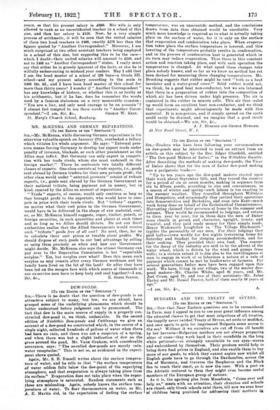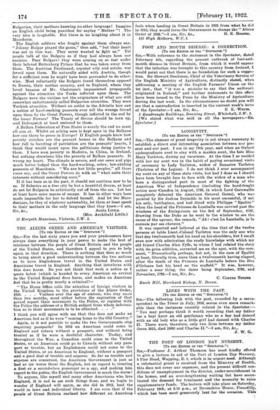BULGARIA AND THE TREATY OF ShVRES.
[To THE EDITOR OF THE 'SPECTATOR.") Snx,—Now-that. Near Eastern questions are to be reooneidered in Paris, may I appeal to you to use your great influence among the educated classes to get that most iniquitous of all treaties, the happily never ratified Treaty of Sevres, set aside or modified. and once again to gain for imprisoned Bulgaria some access to the sea? Without it we ourselves are cut off from all benefit by her harvests—Bulgarian maidens are not always preparing attar of roses—they work hard in their cornfields in the long white petticoats—so strangely unsuitable to our eyes—woven and embroidered by themselves. Their produce would help to bring down food prices in England, and also enable them to buy more of our goods, to which they cannot aspire now whilst all English goods have to go through the Dardanellee, across the Sea of Marmora, and traverse the Bosphorus and the Black Sea to reach their coast, as is now the case. With a port on the Adriatic restored to them they might even become useful members of the European group of nations.
As it is, the age-long plea from Macedonia, "Come over and help us," meets with no attention, their churches and schools are closed, only Greek schools exist there, till now we even hear of children being punished for addressing their mothers in Bulgarian, their mothers knowing no other language! Imagine an English child being punished for saying "Mother "1 The very idea is laughable. But there is no laughing about it in Macedonia.
The English soldiers who fought against them always say, "Johnny Bulger played the game," then add, "but their heart was not in this war. They never wanted to fight us." Yet people talk of the Bulgars as if they had always been our enemies. Poor Bulgars ! they were coming on so feet under their beloved Battenberg Prince-that he was taken away from them. The Austrian Ferdinand, reputed wily and astute, was forced upon them. He naturally sided with Austria, though for a sufficient sum he might have been persuaded to do other- wise. Most reluctantly the Bulgars found themselves opposed to Russia, their mother country, and to England, whom they loved because of Mr. Gladstone's impassioned propaganda against the atrocities the Turks inflicted upon them. The Bulgars were the victims not the originators of what are still somewhat unfortunately called Bulgarian atrocities. They were Turkish atrocities. Without an outlet to the Adriatic how can a nation of hard-working peasants ever tell the wrongs forced upon them by the Great Powers, though inflicted in the end by the lesser Powers? The Treaty of Sevres should be torn up, and Dedeagatch at least restored to them.
A Balkan Federation of Free States is surely the end we must all aim at. Whilst an aching sore is kept open in the Balkans how can there be peace in Europe? If English people knew how poverty stricken are the peasant homes in the Balkans and how full to bursting of patriotism are the peasants' hearth, I think they would insist upon the politicians doing justice to them. I have seen poverty in Madeira, in China, in Ireland, but nothing elsewhere like the poverty of Balkan peasants. It wrung my heart. The climate is severe, and our cows and pigs much better lodged than the hard-working, sober, law-abiding peasants of Macedonia. "We are but little peoples," all those races say, and the Great Powers do with us "what suits their -interests without considering ours."
If it has been so in the past, it should not continue now to be so. If Salonica as a free city be but a beautiful dream, at least do not let Bulgaria be arbitrarily cut off from the sea. Let her at least have some means of escape. It has in other ways been made impossible for her to defend herself. And let the Mace- donians, be they of whatever nationality, let them at leaet speak to their mothers in the only language that they know.—I am, (Mrs. Archibald Little.) 52 Morpeth Mansions, Victoria, S.W. 1.



































 Previous page
Previous page